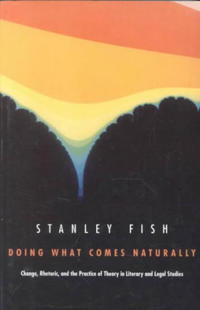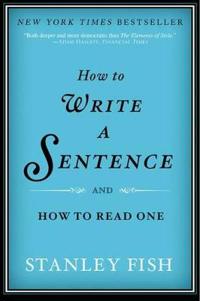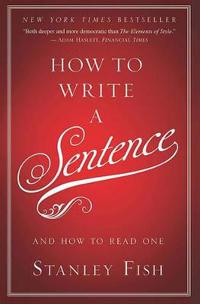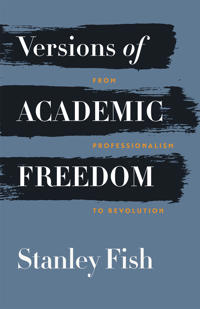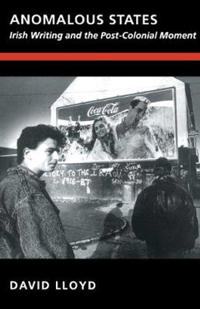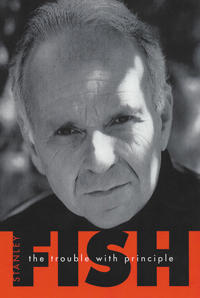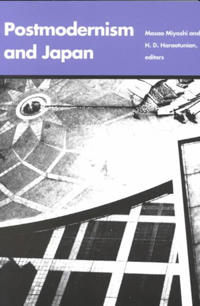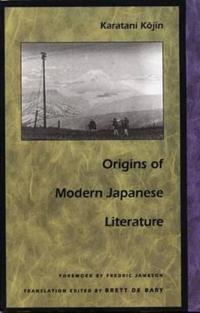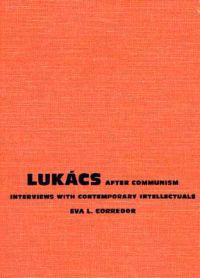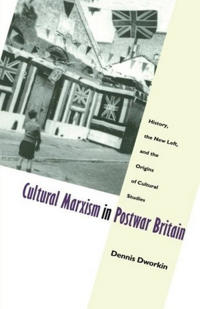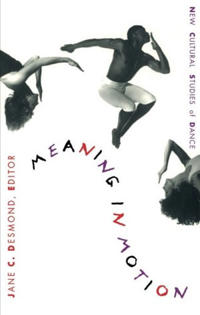Doing What Comes Naturally: Change, Rhetoric, and the Practice of Theory in Literary & Legal Studies (Häftad)
avStanley Fish, Stanley Fish, Fish
ISBN: 9780822309956 - UTGIVEN: 1989-05How to Write a Sentence (Häftad)
avStanley Fish
ISBN: 9780061840531 - UTGIVEN: 201208If you know sentences, you know everything. Good sentences promise nothing less than lessons and practice in the organization of the world. Some appreciate fine art; others appreciate fine wines. Stanley Fish appreciates fine sentences. "The New York Times" columnist and world-class professor has lo[...]
How to Write a Sentence (Inbunden)
avStanley Fish
ISBN: 9780061840548 - UTGIVEN: 201102Some appreciate fine art; others appreciate fine wines. Stanley Fish appreciates fine sentences. The New York Times columnist and world-class professor has long been an aficionado of language. Like a seasoned sportscaster, Fish marvels at the adeptness of finely crafted sentences and breaks them dow[...]
Versions of Academic Freedom (Inbunden)
avStanley Fish
ISBN: 9780226064314 - UTGIVEN: 2014-10Through his columns in the New York Times and his numerous best-selling books, Stanley Fish has established himself as our foremost public analyst of the fraught intersection of academia and politics. Here Fish for the first time turns his full attention to one of the core concepts of the contempora[...]
Is There a Text in This Class? (Häftad)
avStanley Fish
ISBN: 9780674467262 - UTGIVEN: 199007Stanley Fish is one of America's most stimulating literary theorists. In this book, he undertakes a profound reexamination of some of criticism's most basic assumptions. He penetrates to the core of the modern debate about interpretation, explodes numerous misleading formulations, and offers a stunn[...]
Anomalous States: Irish Writing and the Post-Colonial Moment (Häftad)
avDavid Lloyd, Stanley Fish, Fredric Jameson
ISBN: 9780822313441 - UTGIVEN: 1993-04Collect Fish on Stamps (Häftad)
avStanley Gibbons
ISBN: 9780852594421 - UTGIVEN: 1999-04A new addition to the Stanley Gibbons Thematic catalogue range.
The Trouble with Principle (Häftad)
avStanley Eugene Fish
ISBN: 9780674005341 - UTGIVEN: 2001-05Stanley Fish is an equal opportunity antagonist. A theorist who has taken on theorists, an academician who has riled the academy, a legal scholar and political pundit who has ruffled feathers, left and right, Fish here turns with customary gusto to the trouble with principle. Specifically, Fish has [...]
Postmodernism and Japan (Pocket)
avMasao Miyoshi, H. D. (EDT) Harootunian, Stanley Eugene (EDT) Fish
ISBN: 9780822308966 - UTGIVEN: 1989-08"Postmodernism and Japan" is a coherent yet diverse study of the dynamics of postmodernism - described by Lyotard, Baudrillard, Deleuze, and Guatarri - from the often startling perspective of a society bent on transforming itself into the image of Western "enlightened" wealth and power. Essays by Ar[...]
Origins of Modern Japanese Literature (Pocket)
avKaratani Kojin, Brett (TRN) De Bary, Stanley Eugene (EDT) Fish
ISBN: 9780822313236 - UTGIVEN: 1993-05Since its publication in Japan ten years ago, the "Origins of Modern Japanese Literature" has become a landmark book, playing a pivotal role in defining discussions of modernity in that country. Against a history of relative inattention on the part of Western translators to modern Asian critical the[...]
Lukacs After Communism (Pocket)
avEva L. Corredor, Stanley Eugene (EDT) Fish, Fredric (EDT) Jameson
ISBN: 9780822317630 - UTGIVEN: 1997-04Since the collapse of communism in Eastern Europe, the validity of Marxism and Marxist theory has undergone intense scrutiny both within and outside the academy. In "Lukacs After Communism", Eva L. Corredor conducts ten lively and engaging interviews with a diverse group of international scholars to[...]
Cultural Marxism in Postwar Britain (Pocket)
avDennis L. Dworkin, Stanley Eugene (EDT) Fish, Fredric (EDT) Jameson
ISBN: 9780822319146 - UTGIVEN: 1997-05In this intellectual history of British cultural Marxism, Dennis Dworkin explores one of the most influential bodies of contemporary thought. Tracing its development from beginnings in postwar Britain, through its various transformations in the 1960s and 1970s, to the emergence of British cultural s[...]
Meaning in Motion (Pocket)
avJane C. (EDT) Desmond, Stanley Eugene (EDT) Fish, Fredric (EDT) Jameson
ISBN: 9780822319429 - UTGIVEN: 1997-05Dance, whether considered as an art form or embodied social practice, as product or process, is a prime subject for cultural analysis. Yet only recently have studies of dance become concerned with the ideological, theoretical, and social meanings of dance practices, performances, and institutions. I[...]
Gilles Deleuze's Time Machine (Pocket)
avDavid Norman Rodowick, Stanley Eugene (EDT) Fish, Fredric (EDT) Jameson
ISBN: 9780822319702 - UTGIVEN: 1997-08Although Gilles Deleuze is one of France's most celebrated twentieth-century philosophers, his theories of cinema have largely been ignored by American scholars. Film theorist D. N. Rodowick fills this gap by presenting the first comprehensive study, in any language, of Deleuze's work on film and im[...]

